Your care team will visit your room regularly, but if you need help between those visits, please call.
- To reach your nurse or patient care associate, look for their names and numbers on the whiteboard in your room.
- You can call them directly using these numbers or you can use the call button on your bed.
There are many people who will be part of your care team. Each staff member will wear an ID badge and can explain their role in your care or answer any questions. When possible, we encourage you to have a loved one with you — someone we call a patient advocate — to make sure you understand your treatment plan and are getting the help you need. With your consent, and by request, this person can be contacted by phone either during the medical team’s visit to evaluate you or later in the day with an update on how you are doing.
Listed below are a few of the specialists involved in patient care:
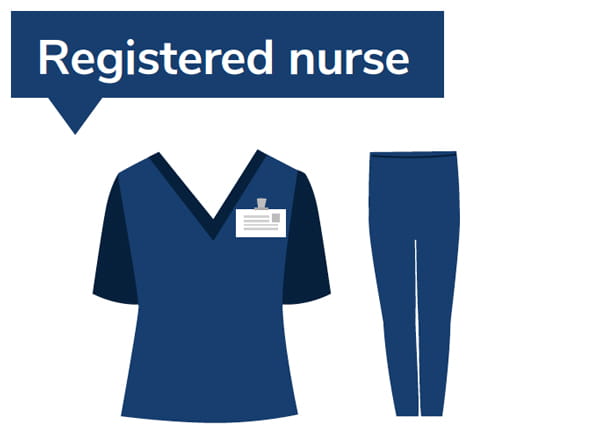 Registered nurse (RN) – the lead on your nursing team who’ll coordinate your care. Your RN will make sure all your nursing needs are met, including medication and health care education. RNs wear a white or navy uniform, and there will be an RN after their name on their ID badge.
Registered nurse (RN) – the lead on your nursing team who’ll coordinate your care. Your RN will make sure all your nursing needs are met, including medication and health care education. RNs wear a white or navy uniform, and there will be an RN after their name on their ID badge.
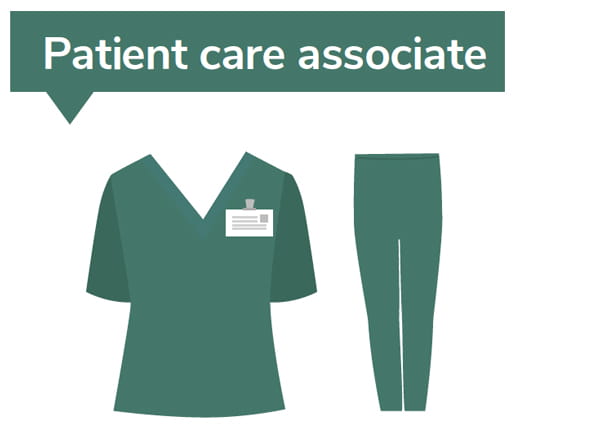 Patient care associate (PCA)/psychiatric care technician (PCT) – takes your vital signs, including temperature and blood pressure, draws blood and helps with meals, bathing and bed changes. PCAs wear a green uniform.
Patient care associate (PCA)/psychiatric care technician (PCT) – takes your vital signs, including temperature and blood pressure, draws blood and helps with meals, bathing and bed changes. PCAs wear a green uniform.
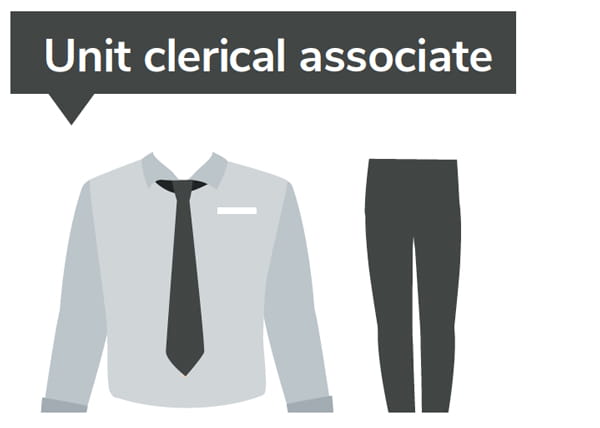 Unit clerical associate (UCA) – works at the nurses station and will be the person getting the help you need when you call on your phone or use the call button. UCAs usually wear business clothes.
Unit clerical associate (UCA) – works at the nurses station and will be the person getting the help you need when you call on your phone or use the call button. UCAs usually wear business clothes.
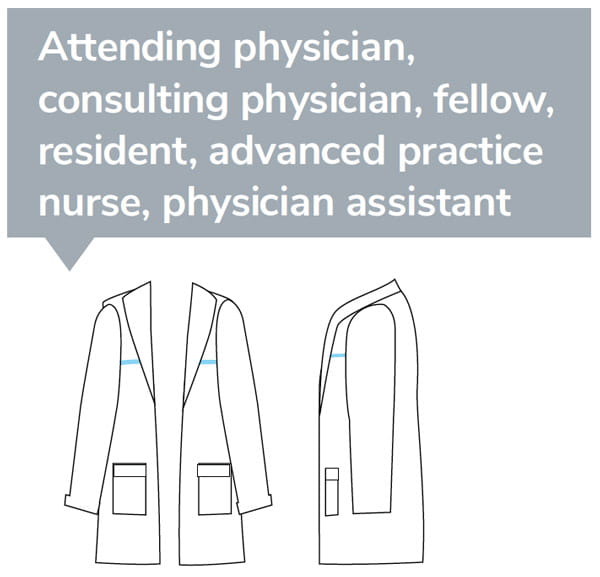 Attending physician – this doctor has the overall responsibility for your care and leads all members of your medical team during your hospital stay. They have completed all stages of medical or surgical training and have been licensed to practice independently. They supervise the resident physicians involved in your daily care and coordinate care between consulting physicians and other hospital staff. Many attending physicians wear a long white lab coat over scrubs or business clothes.
Attending physician – this doctor has the overall responsibility for your care and leads all members of your medical team during your hospital stay. They have completed all stages of medical or surgical training and have been licensed to practice independently. They supervise the resident physicians involved in your daily care and coordinate care between consulting physicians and other hospital staff. Many attending physicians wear a long white lab coat over scrubs or business clothes.
Consulting physician – this doctor has a different specialty than your primary attending physician. Your primary medical team may ask a consulting physician to assist in your care by recommending treatments, tests and procedures related to their area of expertise. A consulting physician might wear a long white lab coat over scrubs or business clothes.
Fellow physician – this is a doctor who has completed residency training and is currently getting advanced training for their chosen sub-specialty. As an example, cardiology has fellows in cardiovascular medicine, interventional cardiology, electrophysiology, heart failure and cardiac transplant, adult congenital heart disease and cardiovascular diagnostic imaging. Fellows work under the supervision of attending physicians and help teach and train other medical team members. They might wear a long white lab coat over scrubs or business clothes.
Resident physician – this is a doctor who has completed medical school and is currently in training for their chosen specialty, for example, internal medicine, family medicine or general surgery. Under the attending physician’s supervision, they directly manage your daily care during your hospital stay. Like other doctors, residents may wear scrubs or business clothes with a long white lab coat.
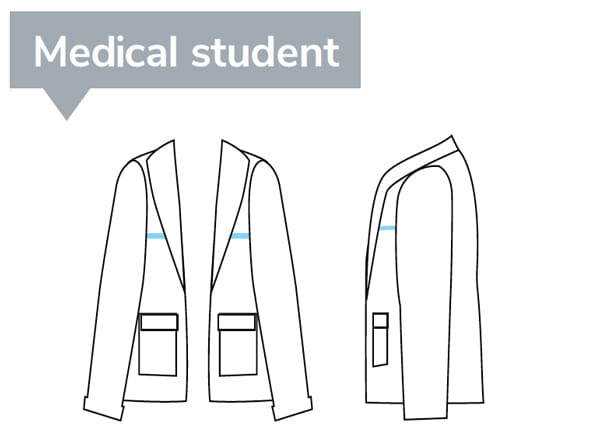 Medical student – this is a student still in medical school training to be a doctor. They will assist with your care by asking about your medical history, performing physical exams and gathering test results under the supervision of the resident and attending physicians. Medical students wear short white lab coats over scrubs or business clothes.
Medical student – this is a student still in medical school training to be a doctor. They will assist with your care by asking about your medical history, performing physical exams and gathering test results under the supervision of the resident and attending physicians. Medical students wear short white lab coats over scrubs or business clothes.
Advanced practice nurse (APN) – this is a registered nurse with advanced nursing training. APNs may wear white lab coats with scrubs or business clothes.
- Certified nurse practitioner (CNP) – focuses on assessment, diagnosis, disease prevention and care in partnership with doctors and other care team members.
- Clinical nurse specialist (CNS) – provides education to patients and the nursing staff in their area of clinical expertise.
- Mental health clinical nurse specialist (CNS) – provides comprehensive, patient-centered mental health and psychiatric care. They help identify mental health issues, develop health and wellness programs and provide ongoing evaluation.
Physician assistant (PA) – has advanced training with a function very similar to a CNP. PAs focus on assessment, diagnosis, disease prevention and care in partnership with doctors and other care team members. They might wear a long white lab coat over scrubs or business clothes.
 Pharmacist – helps select and prepare the right medication at the right dose based on your diagnosis and personal health. A pharmacist screens for medication interaction, looks for the most cost-effective options and provides patient education. Some pharmacists participate in daily patient rounds to assist with medication therapy. Pharmacists might wear a lab coat over business clothes.
Pharmacist – helps select and prepare the right medication at the right dose based on your diagnosis and personal health. A pharmacist screens for medication interaction, looks for the most cost-effective options and provides patient education. Some pharmacists participate in daily patient rounds to assist with medication therapy. Pharmacists might wear a lab coat over business clothes.
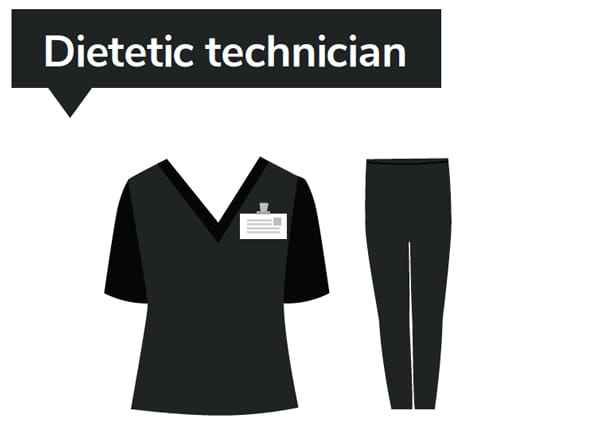 Dietetic technician or registered dietitian – visits patients to help with daily food selection. If you’re not in your room when the dietetic technician visits, you’ll receive the chef’s daily special based on current diet orders. For patients on restricted diets, a registered dietitian will complete a nutritional assessment and help you choose from a variety of foods that meet your medical needs. Dietetic technicians wear a black uniform.
Dietetic technician or registered dietitian – visits patients to help with daily food selection. If you’re not in your room when the dietetic technician visits, you’ll receive the chef’s daily special based on current diet orders. For patients on restricted diets, a registered dietitian will complete a nutritional assessment and help you choose from a variety of foods that meet your medical needs. Dietetic technicians wear a black uniform.
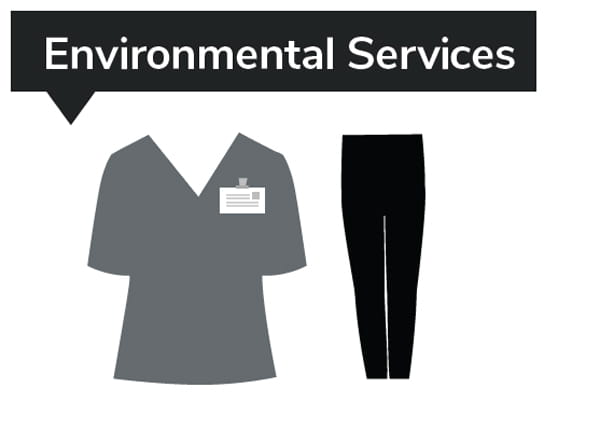 Environmental Services (EVS) staff – clean patient rooms daily. EVS staff wear black and gray uniforms.
Environmental Services (EVS) staff – clean patient rooms daily. EVS staff wear black and gray uniforms.
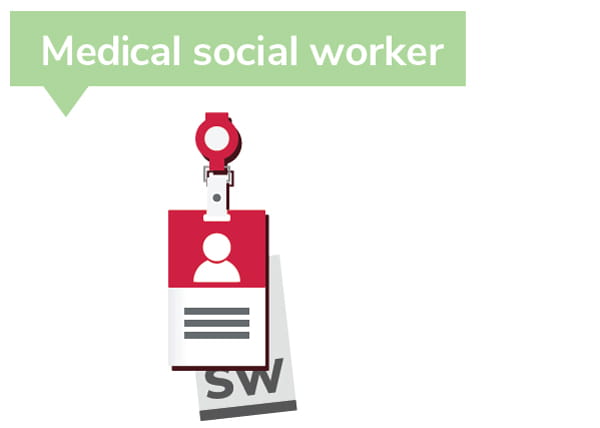 Medical social worker – provides information on resources to help with concerns such as mental health, substance abuse, domestic violence, adult/child protective services and guardianship. The social worker is also the primary team member who helps with arrangements for your care if you are unable to go home after your hospital stay. This may include your transfer to a skilled nursing facility, long-term acute care hospital or inpatient physical rehabilitation facility. Social workers wear business clothes or an eggplant-colored uniform.
Medical social worker – provides information on resources to help with concerns such as mental health, substance abuse, domestic violence, adult/child protective services and guardianship. The social worker is also the primary team member who helps with arrangements for your care if you are unable to go home after your hospital stay. This may include your transfer to a skilled nursing facility, long-term acute care hospital or inpatient physical rehabilitation facility. Social workers wear business clothes or an eggplant-colored uniform.
Care manager – assists the team by helping to arrange for any needed services after your hospital stay. They will work with you to make sure you have a good plan in place before you leave the hospital. For example, they may arrange for medical equipment at home (oxygen tanks, walkers, etc.), home health care services, obtain financial assistance and connect you with other community resources. Care managers wear business clothes.
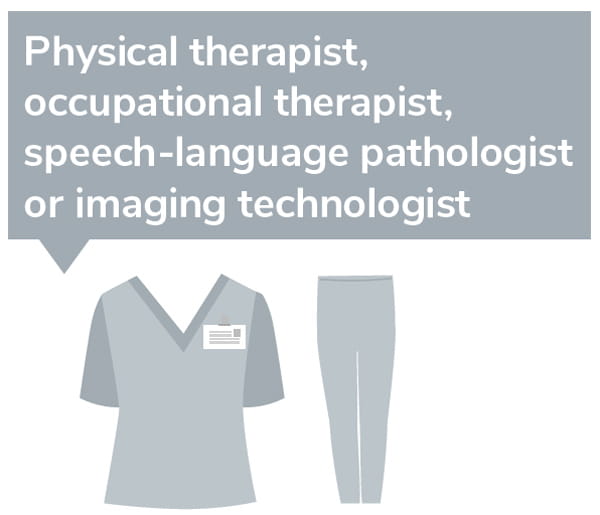 Physical therapist, occupational therapist or speech-language pathologist – evaluates and helps patients regain normal function or improve a speech or swallowing disorder. These therapy experts wear gray uniforms.
Physical therapist, occupational therapist or speech-language pathologist – evaluates and helps patients regain normal function or improve a speech or swallowing disorder. These therapy experts wear gray uniforms.
Imaging technologist – performs imaging tests, including X-rays, ultrasounds or MRIs, in patient rooms or in the Radiology Department. Imaging technologists wear a gray uniform.
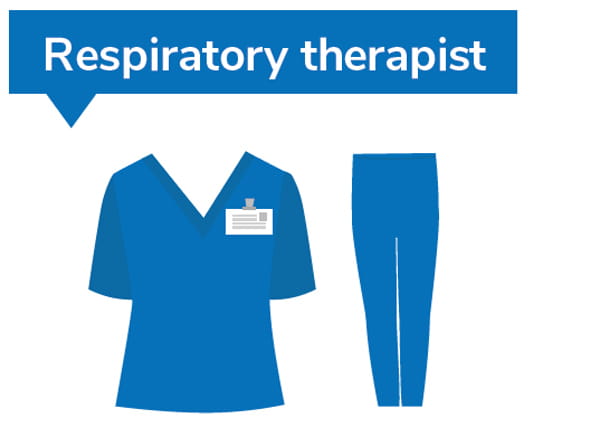 Respiratory therapist – gives patients breathing treatments or oxygen. Respiratory therapists wear a royal blue uniform.
Respiratory therapist – gives patients breathing treatments or oxygen. Respiratory therapists wear a royal blue uniform.
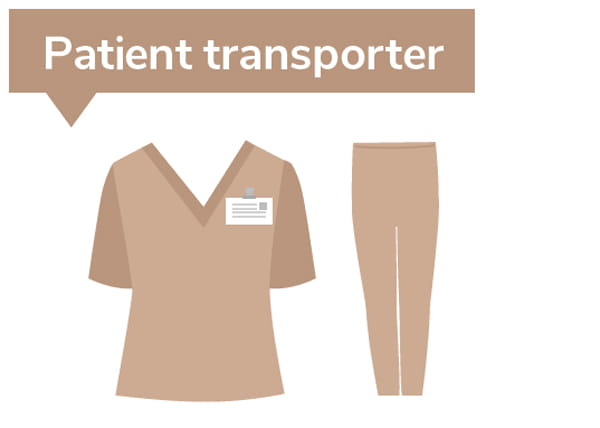 Patient transporter – takes patients to different areas of the hospital for tests and procedures. Depending on your needs, a nurse may also come with you during these times. A transporter wears a tan uniform.
Patient transporter – takes patients to different areas of the hospital for tests and procedures. Depending on your needs, a nurse may also come with you during these times. A transporter wears a tan uniform.
Pastoral care chaplain – offers a compassionate presence, a listening ear and other spiritual or emotional support. With respect for all faiths, chaplains perform prayers, sacraments or rituals. To request a visit with a chaplain or access other spiritual services, talk with your care team or contact the Department of Chaplaincy from 7:30 a.m. to 4 p.m.
- The Ohio State Wexner Medical Center and The James: 614-293-8791
- East Hospital: 614-257-3255
- During any other time, you can reach the on-call chaplain by calling the operator at 614-293-8000
Patient Experience – assists with any nonmedical questions or concerns to make your stay as pleasant and comfortable as possible.
